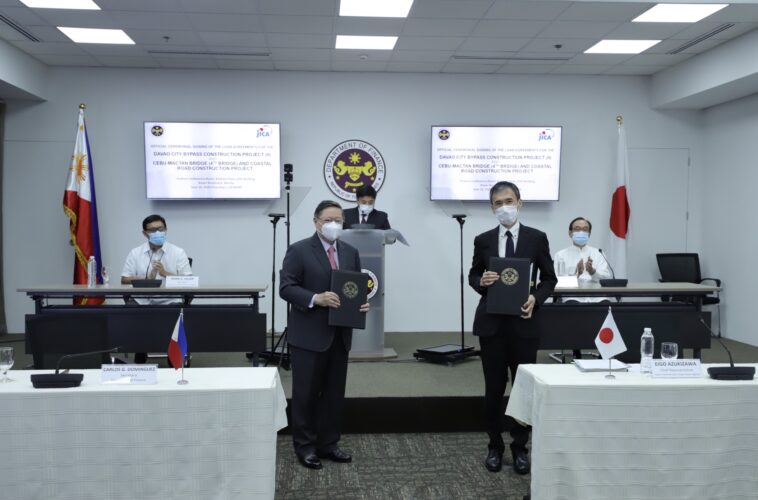
The Philippines and Japan have signed two loan agreements worth a combined P75.5 billion (about 154 billion yen) for two big-ticket projects in the Visayas and Mindanao.
Finance Secretary Carlos Dominguez III and Japan International Cooperation Agency (JICA) chief representative Eigo Azukizawa on June 16 signed the agreements for the P57-billion (JPY119 billion) loan to support construction of the Cebu-Mactan Fourth Bridge and the Coastal Road Construction project in the Visayas, and the supplemental financing of P18.5 billion (JPY35 billion) for the Davao City Bypass Construction Project.
“We express our heartfelt gratitude to the people and the Government of Japan, represented today by the officials of JICA and of course, by His Excellency, the Ambassador of Japan to the Philippines, for their generosity and earnestness in supporting our infrastructure modernization program. Given the challenging circumstances, these projects bring more support to our economic recovery well beyond their nominal value,” Dominguez said after the signing of the loan agreements.
The approval of the loans for the two projects were fast tracked through high-level consultations between the Philippines and Japan. The P18.5-billion loan agreement is supplemental to the loan accord worth P9.27 billion (JPY23.9 billion) signed in 2015.
Azukizawa pointed out the agreements were signed even amid the global crisis triggered by the coronavirus disease 2019 (COVID-19) pandemic.
“I hope that these projects will also contribute to the economic recovery of the country amidst the COVID-19 pandemic as we fully support your government’s pronouncement that restarting and accelerating the ‘Build, Build, Build’ program should be one of many strategies for reviving the Philippine economy,” Azukizawa said.
Dominguez underscored the importance of the signing of the two loan agreements for the bridge and bypass road projects as investments in infrastructure provide the highest multiplier effects to power the rapid recovery of the economy in the near term.
Both projects are expected to revitalize the economy and create more jobs in Visayas and Mindanao as the country firms up its recovery starting next year from the COVID-19 pandemic.
The loans for these projects both carry highly concessional lending terms of 0.10% interest rate per year for non-consulting services and 0.01% for consulting services, with a maturity period of 40 years inclusive of a 12-year grace period.
The Cebu-Mactan Fourth Bridge and the Coastal Road Construction project is the biggest infrastructure project in the Visayas under the administration’s Build, Build, Build infrastructure program with a total estimated cost of P76.4 billion (about US$1.59 billion or JPY168.96 billion).
JICA has committed to fund 75% of the total cost of the project through official development assistance (ODA) financing, while the remaining 25% or P18.82 billion (about US$442.76 million or JPY49.73 billion) will be covered by local financing.
This project aims to improve the capacity of the existing road network connecting mainland Cebu and Mactan Island, to facilitate the faster movement of trade and people between the two areas.
It involves the construction of a 3.3-kilometer (km) bridge with an elevated viaduct of 3.38 km (four-lane road, with two lanes in each direction); and a 4.9-km four-lane coastal road with an elevated viaduct of 4.75 km.
The bridge component will be built using the steel box girder-with-orthotropic steel deck method, known for being the most innovative and shortest period of bridge construction.
This will also allow the future expansion of the four-lane bridge to six lanes.
On top of the loan, JICA will also finance the detailed engineering design for the project, which is expected to start groundwork in 2021 and be completed in 2029.
The Davao City Bypass Construction project, meanwhile, is expected to reduce congestion in Davao City and improve accessibility to its major development hubs through the construction of a 45.5-km, four-lane bypass road.
It includes a 2.3-km main tunnel, which will utilize advanced Japanese technologies for its construction, and 0.5-km four-lane cut-and-cover tunnel section running through the mountainous terrain in Barangay Magtuod, Davao City.
Stretching from the Davao-Digos intersection of the Pan Philippine Highway at Toril, Davao City to the Davao-Agusan National Highway in Panabo City, the project is expected to reduce travel time between the two points from the current one hour and 44 minutes–using the existing Maharlika Highway–to only 49 minutes.
Construction will start this year; the project will be operational by 2023.





